- Home
- Jennifer Donnelly
Northern Light Page 3
Northern Light Read online
Page 3
"Weaver Smith is no recommendation."
"Please, Pa," I whispered.
"No, Mattie. And that's the end of it. There are all sorts at those tourist hotels."
"All sorts" meant men. Pa was always warning me about the woodsmen, the trappers, the guides, and the surveyors. The sports up from New York or down from Montreal. The men in the theatrical troupes from Utica, the circus men from Albany, and the Holy Rollers that followed in their wake. "Men only want one thing, Mathilda," he was always telling me. The one time I asked, "What thing?" I got a cuff and a warning not to be smart.
It wasn't the idea of strange men that bothered Pa. That was just an excuse. He knew all the hotel people, knew most of them ran respectable places. It was the idea of somebody else leaving him. I wanted to argue, to make him see reason. But his jaw was set firm, and I saw a little muscle jumping in his cheek. Lawton used to make that muscle jump. Last time he did, Pa swung a peavey at him and he ran off, and no one heard from him for months. Until a postcard came from Albany.
I finished the dishes without a word and left for the Hubbards'. My feet were as heavy as two blocks of ice. I wanted to earn money. Desperately. I had a plan. Well, more a dream than a plan, and the Glenmore was only part of it. But I wasn't feeling very hopeful about it just then. If Pa said no to the Glenmore, which was only a few miles up the road, what on earth would he say to New York City?
abe • ce • dar • i • an
If spring has a taste, it tastes like fiddleheads. Green and crisp and new. Mineralish, like the dirt that made them. Bright, like the sun that called them forth. I was supposed to be picking them, me and Weaver both. We were going to fill two buckets—split one for ourselves and sell one to the chef over at the Eagle Bay Hotel—but I was too busy eating them. I couldn't help it. I craved something fresh after months of old potatoes, and beans from a jar.
"Choofe...," I tried to say, but my mouth was full. "Weba ... choofe a wurb..."
"My mamma's pig's got better manners. Why don't you swallow first?" Weaver said.
I did. But not before I'd chewed some more, and licked my lips and rolled my eyes and grinned. Fiddleheads are that good. Pa and Abby like them best fried up with sweet butter, salt, and black pepper, but I like them best right out of the ground.
"Choose a word, Weaver," I finally said. "Winner reads, loser picks."
"Are you two fooling again?" Minnie asked. She was sitting near us on a rock. She was in the family way and was very fat and grumpy.
"We're dueling, not fooling, Mrs. Compeau," Weaver replied. "It's a very serious business, and we would appreciate quiet from the seconds."
"Give me a bucket, then. I'm starving."
"No. You're eating everything we pick," Weaver said.
She turned her hangdog eyes on me. "Please, Mattie?" she wheedled.
I shook my head. "Dr. Wallace said you were to take exercise, Min. He said it would do you good. Get down and pick your own fiddleheads."
"But, Matt, I took my exercise already. I walked all the way up here from the lake. I'm tired..."
"Minnie, we're trying to duel here, if you don't mind," Weaver huffed.
Minnie grumbled and sighed. She lumbered off the rock and crouched down amongst the fiddleheads, snapping off one after another. She ate them fast, shoving them into her mouth with the heel of her hand, not even taking time to taste them. Watching her, I had the funniest notion that if I came too near, she would growl at me. She didn't used to like fiddleheads, but that was before she started growing a baby and eating everything in sight. She'd told me she'd licked a lump of coal once when no one was looking. And sucked a nail.
Weaver flipped open the book he was holding. His eyes lit on a word. "Iniquitous," he said, slapping the book closed. We stood back-to-back, cocking the thumbs on our right hands and sticking out our pointer fingers to make guns.
"To the death, Miss Gokey," he said solemnly.
"To the death, Mr. Smith."
"Minnie, you give the orders."
"No. Its silly."
"Come on. Just do it."
"Count off," Minnie sighed.
We walked away from each other, counting off paces. At ten, we turned.
"Draw." She yawned.
"It's supposed to be to the death, you know, Minnie. You could make an effort," Weaver said.
Minnie rolled her eyes. "Draw!" she shouted.
We did.
"Fire!"
"Evil!" Weaver yelled.
"Immoral!" I shouted.
"Sinful!"
"Wrong!"
"Unrighteous!"
"Unjust!"
"Wicked!"
"Corrupt!"
"Nefarious!"
" 'Nefarious'? Jeezum, Weaver! Urn ... urn ... hold on, I have one..."
"Too late, Matt. You're dead," Minnie said.
Weaver smirked at me and blew on the tip of his finger. "Start picking," he said. He made a cushion out of his jacket and settled himself down with The Count of Monte Cristo, folding his long grasshopper legs underneath him. One bucket alone was a lot to fill, never mind two. And Minnie would be no help. She'd already waddled back to her rock. I should have known better than to challenge Weaver to a word duel. He always won.
Picking fiddleheads was only one of our moneymaking schemes. If it wasn't fiddleheads we were gathering, it was wild strawberries or blueberries or lumps of spruce gum. Wed end up with ten cents here, a quarter there. Twenty-five cents seemed like a fortune to me when all I wanted was a bag of chocolate babies or a licorice rope, but not anymore. I needed money. Quite a bit. New York City, people said, was very expensive. Last November I had five whole dollars, which was only one dollar and ninety cents shy of a train ticket to Grand Central Station. Miss Wilcox entered a poem of mine in a contest sponsored by the Utica Observer. I got my name in the paper, and my poem, too, and I won five dollars.
Didn't have it long, though. We needed it to help pay for Mamma's headstone.
"'On the 24th of February, 1810, the lookout at Notre-Dame de la Garde signaled the three-master, the Pharaon from Smyrna, Trieste, and Naples. As usual, a pilot put off immediately, and rounding the Chateau d'If...,'" Weaver began. As he read, I poked around with a stick, searching for the tiny green furls coming up through the wet, rotted leaves, each one curled in on itself like the end of a fiddle. They come up in moist, shady areas, and though they start small, they have a lot of push. I have seen them dislodge heavy rocks in their eagerness to grow. This patch, on a hill of maples and pines a quarter mile west of Weaver's place, is a good one. Nobody besides us knows about it. There are enough fiddleheads for two buckets today and another two tomorrow. We never pick them all. We leave plenty alone to become ferns.
I got my first bucket filled maybe one-third of the way, and then picking started to pale beside the sailors Dantes and Danglars and their goings-on, and I got taken outside myself like I always do by a good story and forgot all about fiddleheads and buckets and money and everything in the world except the words.
"'...We will leave Danglars struggling with the demon of hatred,'" Weaver read, '"and endeavoring to insinuate in the ear of the ship owner some evil suspicions against his comrade and...' Hey! Get picking, Matt! Mattie, did you hear me?"
"Huh?" I stood there in a trance, the bucket at my feet, listening as the words became sentences and the sentences became pages and the pages became feelings and voices and places and people.
"You gotta pick, not stand there looking touched."
"All right," I sighed.
Weaver closed the book. "Forget it. I'll help. We'll never get done otherwise. Give me a hand."
I reached for him and he pulled himself up, nearly pulling me over as he did. I have known Weaver Smith for over ten years now. He is my best friend. Him and Minnie both. But I still have to smile every time we take hands. My skin is so pale you can nearly see through it, and his is as dark as tobacco. There's more alike than different about Weaver and me, though. His palms are
pink like mine. And his eyes are brown like mine. And inside, he's exactly like me. He loves words, too, and there is nothing he would rather do than read a book.
Weaver was the only black boy in Eagle Bay. And Inlet, Big Moose Lake, Big Moose Station, Minnowbrook, Clearwater, Moulin, McKeever, and Old Forge, too. Maybe in all of the North Woods. I had never seen another. Black men came to work on Webb's railroad a few years ago, the new one that runs from Mohawk to Malone and right on up into Montreal. They stayed at Buckley's Hotel in Big Moose Station—a settlement a few miles west of Big Moose Lake—but they left as soon as the last spike was driven in. One told my pa that the Bowery, the roughest stretch of road in New York City, had nothing on Big Moose Station on a Saturday night. He said that the blackflies hadn't managed to kill him, nor had Jerry Buckley's whiskey, nor the brawling lumberjacks, either, but Mrs. Buckley's cooking surely would and he was leaving before it did.
Weaver's mamma moved herself and Weaver up here from Mississippi after Weaver's father was killed right in front of them by three white men for no other reason than not moving off the sidewalk when they passed. She decided the farther north they got, the better. "Heat makes white people mean," she told Weaver and, having heard about a place called the Great North Woods, a place that sounded cold and safe, decided she and her son would move there. They lived about a mile up the Uncas Road, just south of the Hubbards, in an old log house that someone abandoned years ago.
Weavers mamma took in washing. She got a lot of business from the hotels and lumber camps. She washed table and bed linens in the summer, and in the fall and spring and winter, she washed wool shirts and pants and long Johns that had been worn for months at a time. Weaver's mamma boiled them clean in a huge iron pot in her backyard. She boiled the jacks clean, too, making them get in a tin tub and scrub themselves pink before they put their clothes back on. When a whole crew came out at once, it was best not to stand downwind. "Weaver's mamma's cooking underwear soup today," Lawton used to say.
She raised chickens, too. Scores of them. During the warmer months, she fried up four or five every evening, and baked biscuits and pies, too, and took it all down to the Eagle Bay railroad station the next day in her cart to meet the trains. Between the engineer and the conductors and all the hungry tourists, she sold everything she made. She put every penny she earned in an old cigar box that she kept under her bed. Weaver's mamma worked as hard as she did so she could send Weaver away to college. To the Columbia University in New York City. Miss Wilcox, our teacher, encouraged him to apply. He'd been granted a scholarship and planned to study history and politics and then go on to law school one day. He was the first freeborn boy in his family. His grandparents were slaves, and even his parents were born slaves, though Mr. Lincoln freed them when they were tiny children.
Weaver always says freedom is like Sloan's Liniment, always promising more than it delivers. He says all it really means is being able to choose among the worst jobs at the logging camps, the hotels, and the tanneries. Until his people can work anywhere whites work, and speak their minds freely, and write books and get them published, until white men are punished for stringing up black men, no black person will ever really be free.
I was scared for Weaver sometimes. We had hillbillies in the North Woods, same as they had in Mississippi—ignorant folk just itching to blame their no-account lives on someone else—and Weaver never stepped off the sidewalk or doffed his hat. He'd scrap with anyone who called him nigger, and was never scared for himself. "Go round cringing like a dog, Matt," he said, "and folks will treat you like one. Stand up like a man, and they'll treat you like a man." That was fine for Weaver, but I wondered sometimes, How exactly do you stand up like a man when you're a girl?
"The Count of Monte Cristo's a good book already, isn't it, Mattie? And we're only on the second chapter," Weaver said.
"It sure is," I replied, bending down by a big clutch of fiddleheads.
"You writing any more stories yourself?" Minnie asked me.
"I've no time. No paper, either. I used up every page in my composition book. But I'm reading a lot. And learning my word of the day."
"You ought to use your words, not collect them. You ought to write with them. That's what they're for," Weaver said.
"I told you I can't. Don't you listen? And anyway, there's nothing to write about in Eagle Bay. Maybe in Paris, where Mr. Dumas lives—"
"Doo-mah."
"What?"
"Doo-mah, not Dumb-ass. Aren't you half French?"
"...where Mr. Doo-mahhhh lives, where they have kings and musketeers, but not here," I said, sounding testier than I wanted to. "Here there's just sugaring and milking and cooking and picking fiddleheads, and who'd want to read about any of that?"
"You don't have to snap, you snapping turtle," Minnie said.
"I'm not snapping," I snapped.
"The stories Miss Wilcox sent to New York weren't about kings or musketeers," Weaver said. "That one about the hermit Alvah Dunning and his Christmas all by himself, that was the best story I ever read."
"And old Sam Dunnigan wrapping up his poor dead niece and keeping her in the icehouse all winter till she could be buried," Minnie added.
"And Otis Arnold shooting a man and then drowning himself in Nick's Lake before the sheriff could take him from the woods," Weaver said.
I shrugged, poking in the leaves.
"What about the Glenmore?" Minnie asked.
"I'm not going."
"What about New York? You hear anything?" Weaver asked.
"No."
"Miss Wilcox get anything in the mail?" he pressed.
"No."
Weaver poked around some, too, then said, "That letter will come, Matt. I know it will. And in the meantime you can still write, you know. Nothing can stop you from writing if you really want to."
"It's all right for you, Weaver," I shot back angrily. "Your mamma lets you alone. What if you had three sisters to look after and a father and a big damn farm that's nothing but endless damn work? What about that? You think you'd be writing stories then?" I felt my throat tightening and swallowed a few times to get the lump out. I don't cry much. Pa's got a quick backhand and little patience for sulks or tears.
Weaver's eyes locked on mine. "It's not work that stops you, is it, Matt? Or time? You've always had plenty of one and none of the other. It's that promise. She shouldn't have made you do it. She had no right."
Minnie knows when to quit, but Weaver doesn't. He was like a horsefly buzzing around and around, looking for an opening, a tender spot, then biting so hard it hurt.
"She was dying. You would've done the same for your mother," I said, looking at the ground. I could feel my eyes tearing and I didn't want him to see.
"God took her life and she took yours."
"You shut up, Weaver! You don't know anything about it!" I shouted, the tears spilling.
"You sure have a big mouth, Weaver Smith," Minnie scolded. "Look what you did. You should say you're sorry."
"I'm not sorry. It's true."
"Lots of things are true. Doesn't mean you can go round saying them," Minnie said.
There was a silence between us then, with nothing to break it for quite some time but the plink plink plink of fiddleheads dropping in our pails.
A few months back, Weaver did something—something he says he did for me, but I say he did to me. He took my composition book—which I had tossed across the train tracks and into the woods—and he gave it to Miss Wilcox.
This composition book was where I wrote my stories and poems. I'd only shown them to three people: my mamma, Minnie, and Weaver. Mamma said they made her cry, and Minnie said they were awfully good. Weaver said they were better than good and told me I should show them to Miss Parrish, our teacher before Miss Wilcox came. He said she would know what to do with them. Maybe send them to a magazine.
I didn't want to, but he kept badgering, so I finally did. I don't know what I was hoping for. Some small praise, I guess. A bit
of encouragement. I didn't get it. Miss Parrish took me aside one day after school let out. She said she'd read my stories and found them morbid and dispiriting. She said literature was meant to uplift the heart and that a young woman such as myself ought to turn her mind to topics more cheerful and inspiring than lonely hermits and dead children.
"Look around yourself, Mathilda," she said. "At the trees and the lakes and the mountains. At the magnificence of nature. It should inspire joy and awe. Reverence. Respect. Beautiful thoughts and fine words."
I had looked around. I'd seen all the things she'd spoken of and more besides. I'd seen a bear cub lift its face to the drenching spring rains. And the silver moon of winter, so high and blinding. I'd seen the crimson glory of a stand of sugar maples in autumn and the unspeakable stillness of a mountain lake at dawn. I'd seen them and loved them. But I'd also seen the dark of things. The starved carcasses of winter deer. The driving fury of a blizzard wind. And the gloom that broods under the pines always. Even on the brightest of days.
"I don't mean to discourage you, dear," she'd added. "Why don't you try to find a new subject? Something a little less unsavory. How about spring? There's so much you could write about spring. Like the new green leaves. Or the pretty violets. Or the return of robin redbreast."
I didn't answer her. I just took my composition book and left, tears of shame scalding my eyes. Weaver was waiting for me outside of the schoolhouse. He asked me what Miss Parrish had said, but I wouldn't tell him. I waited until we were a mile out of town, then I pitched my composition book into the woods. He ran right after it. I told him he had no business with it. I wanted it gone. But he said since I'd thrown it away it wasn't mine anymore. It was his and he could do as he liked with it.
Being the malignant weasel that he is, he kept hold of it and he waited. And then Miss Parrish's mother took ill and she left to go to Boonville and nurse her, and the school trustees got Miss Wilcox, who was renting the old Foster camp in Inlet, to take her place. And Weaver gave Miss Wilcox my composition book without even telling me. And she read my stories and told me I had a gift.

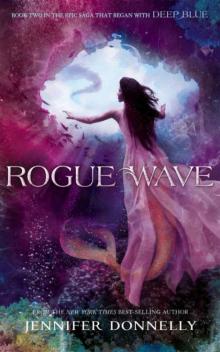 Rogue Wave
Rogue Wave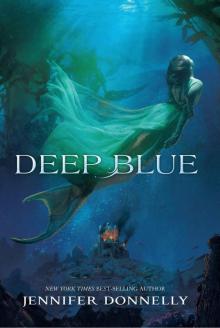 Waterfire Saga, Book One: Deep Blue (A Waterfire Saga Novel)
Waterfire Saga, Book One: Deep Blue (A Waterfire Saga Novel)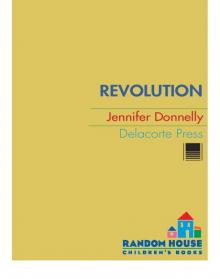 Revolution
Revolution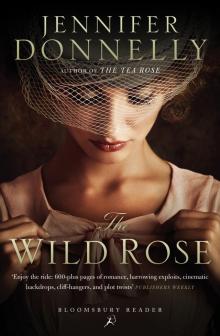 The Wild Rose
The Wild Rose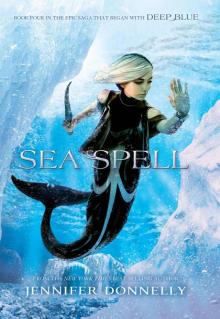 Waterfire Saga (4 Book Series)
Waterfire Saga (4 Book Series)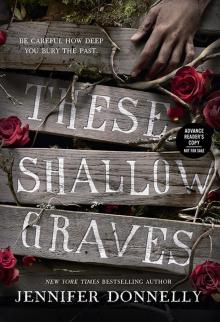 These Shallow Graves
These Shallow Graves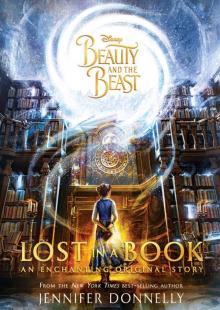 Beauty and the Beast: Lost in a Book
Beauty and the Beast: Lost in a Book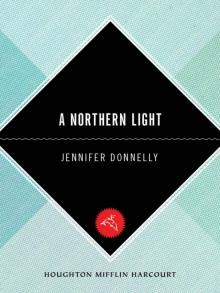 A Northern Light
A Northern Light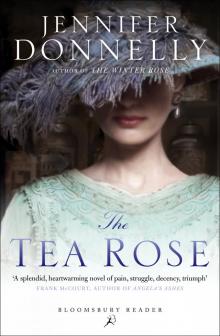 The Tea Rose
The Tea Rose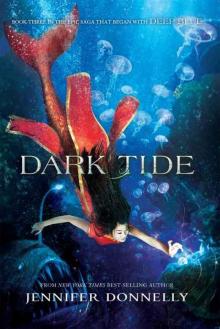 Waterfire Saga, Book Three: Dark Tide: A Deep Blue Novel
Waterfire Saga, Book Three: Dark Tide: A Deep Blue Novel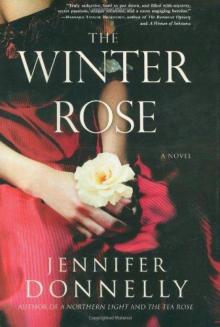 The Winter Rose
The Winter Rose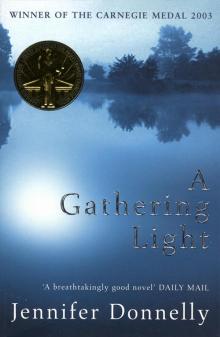 A Gathering Light
A Gathering Light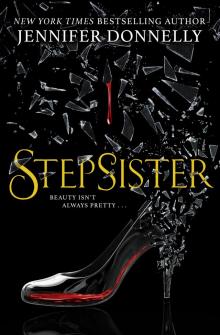 Stepsister
Stepsister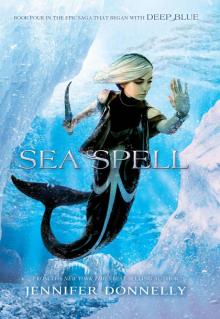 Waterfire Saga, Book Four: Sea Spell: Deep Blue Novel, A
Waterfire Saga, Book Four: Sea Spell: Deep Blue Novel, A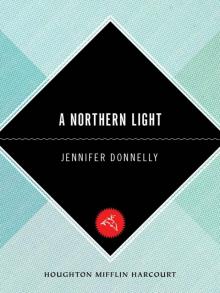 Northern Light
Northern Light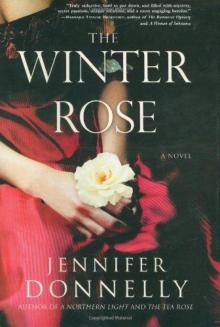 Winter Rose, The
Winter Rose, The